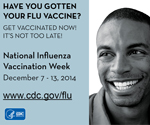Protect Yourself from the Flu: Important Information for People at Risk for and Living with HIV

The cold winter months are upon us, along with the flu season. Seasonal flu is a contagious respiratory illness caused by influenza viruses. The virus is spread by droplets made when people with flu cough, sneeze or talk. Some scientists believe that the cold, dry air of the winter months is one of the factors that helps flu to spread. The virus can cause mild to severe illness and, in some cases, even lead to death. According to CDC, approximately 5-20% of U.S. residents get the flu each year.
Seasonal flu is a special concern for people living with HIV because HIV can make your body too weak to fight off the flu. HIV also increases your risk for serious flu-related complications. For this reason, people who have HIV and those who live with and/or care for them should get a flu vaccine. If you haven't gotten the flu vaccine, it's not too late! Flu season typically starts in the fall and peaks in January and February.
This week is National Influenza Vaccination Awareness Week, so we encourage you to learn more about the seasonal flu, take steps to protect yourself, and educate others. Here are some resources to help you:
- Read my 2011 blog post, Staying Healthy During Flu Season: Advice for People Living with HIV/AIDS
- Read more about seasonal flu at flu.gov and take a look at its special page HIV/AIDS and the Flu, which discusses how HIV/AIDS increases your risk of prolonged illness and serious flu complications. CDC also offers a page on HIV/AIDS and the Flu: Questions and Answers.
- Take simple, everyday precautions, such as washing your hands frequently and coughing or sneezing into your sleeve or into a tissue and discarding it. These actions prevent you from getting the flu and from spreading it to others if you have it.
- Most importantly, get a flu vaccine! Use flu.gov’s Flu Vaccine FinderExit Disclaimer to find a flu vaccine location near you.
Remember, getting vaccinated is the single best way you can protect yourself against this serious illness.